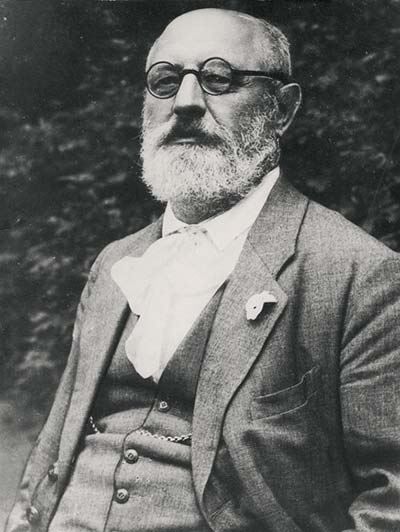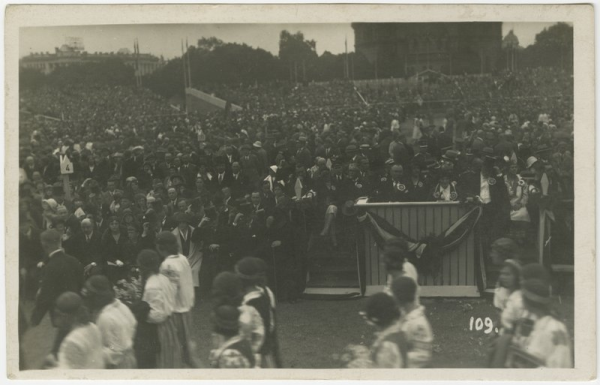Jāzeps Vītols
1863–1948
Composer, conductor, organist, pianist, educator, music critic
An outstanding personality in Latvia’s musical culture – the first internationally known Latvian composer, a notable educator of Latvian music. Also acted as a conductor, music critic and musical public figure.
Born on 26 July 1863 at the Ģīmja mill in Valmiera. Studied at the Jelgava Realschule (1870-1877), taking private lessons in violin, piano, organ and music theory. Studied at the St Petersburg Conservatory (1980-1886), later becoming an educator at the Conservatory (1886-1918). His students included such prominent musicians as Sergey Prokofiev, Nikolai Myaskovsky, Sargis Barkhudaryan, Jānis Zālitis, Ādolfs Ābele and Harijs Ore. During his St Petersburg period, worked for the St Petersburg German newspaper the St Petersburger Zeitung, regenerated and directed the St Petersburg Latvian Charitable Society choir and founded the St Petersburg Latvian Singing Society mixed choir (1908).
The conductor’s mastery was proved at the Vth All-Latvian Song Festival choir competition, where his St Petersburg Singing Society mixed choir won 1st place, sharing it with choirs conducted by Pauls Jozuus. The newspapers, praising the professor’s work with the massed choir, say “under the baton of chief conductor Vītols, the choir was able to perform much more lissomly, more subtly and more touchingly than under the command of some of his esteemed colleagues.” (Grauzdiņa, Ilma, Izredzētie (The Chosen Few), 2008, p 50)
From 1891, Vītols participated in folklore collection with his closest friend Jurjānu Andrejs. After returning to Latvia in 1919, he took over the leadership of the newly established Conservatory of Latvia (1919-1944) and supervision of the composition theory class. In his time, he nurtured a whole host of Latvian composers, including Lūcija Garūta, Jēkabs Graubiņš, Helmers Pavasars, Jānis Norvilis, Volfgangs Dārziņš, Leonīds Vīgners, Jānis Ivanovs, Pēteris Barisons, Ādolfs Skulte, Bruno Skulte and Tālivaldis Ķeniņš.
As an active public figure, he participated in various organisations, was an activist for the Rīga Latvian Society’s Music Committee, chairman of the Latvian Composers’ Group (1923-1938), founder and chairman of the Latvian Song Festival Society (1931-1938), the first chairman of the Latvian SSR Composers’ Union, participated in the rejuvenation of the Latvian Opera.
In 1944, he escaped to Germany as a refugee, where he continued his musical teaching and actively participated in organising various days of songs and song festivals for the Latvian exile community.
The memoirs of Vītols – Memories of my Life – have significant cultural and historical value. With his own legacy (some 900 compositions), the composer rapidly propelled the development of professional music in Latvia and laid the foundations for almost all genres in Latvian music – symphonic, piano, organ, string quartet, choral ballads and children’s songs, as well as being one of the first composers of theatre music. To this day, Vītols’ songs continue to be included in the cream of the song festival repertoire, those most often sung being Gaismas pils (Castle of Light), Beverīnas dziedonis (The Beverina Minstrel), Karaļmeita (The King’s Daughter) and Mežezers (Forest Lake).
A chief conductor at the IVth and Vth All-Latvian Song Festivals, one of the main organisers of the VIth-IXth Song Festival, a member of the choir competition jury at the IIIrd Song Festival, as well as a chief conductor for Latvian exile community days of song and song festivals.
“In the history of Latvian music, Vītols, as a leader of choirs, has to be placed in his own category. The great majority of conductors will only start rehearsing a song when they have already developed a very detailed plan for it, from which they will not depart. Vītols, however, was different. His impulsive, robustly capricious nature is more likely to abandon itself to his mood at that instant, i.e., each moment is also given a certain creative significance. And this is a trait of a true artist. ... When it comes to the natural tempo and the correct interpretation of the content of any composition, rarely would Vītols have had to reconsider: the first is supported by his flexible temperament, the second will be resolved, thanks to his rich, artistically ingenious nature.” (Zalītis, Jānis, Dzimtenes vēstnesis (Homeland Herald), 22 November 1911.)
Commander (1926) and Grand Officer (1927), Order of the Three Stars, Homeland Prize Laureate (1937), also received several other Latvian and foreign awards.

![7. Vispārējie Dziesmu svētki Rīgā. Dziesmu svētku klausītājus uzrunā Latviešu dziesmu svētku biedrības priekšsēdētājs Jāzeps Vītols [attēls]](https://dziesmusvetki.lndb.lv/wp-content/uploads/objects/41305/resized/2resized_thumbnail.png)

![8.latviešu dziesmu svētki. 60.g. dziesmu svētki [attēls]. Pirmā rindā no kreisās: Teodors Kalniņš, Jāzeps Vītols, Alfrēds Kalniņš, Emilis Melngailis, Teodors Reiters](https://dziesmusvetki.lndb.lv/wp-content/uploads/objects/41650/resized/2resized_thumbnail.png)




















